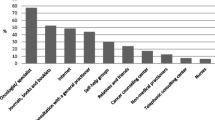Abstract
Objective
The objective of this study was to evaluate the extent of internet access and use and patient characteristics associated with internet use. We also aimed to study when and at which sites cancer patients search for information, the self-reported effect on health care use, and patients’ wishes with respect to future internet possibilities.
Materials and methods
We drew a sample of 390 patients diagnosed with breast (n = 128), prostate (n = 96), or gynecological (n = 89) cancer or lymphoma (n = 77) in four different hospitals in the period 2002–2004, who were 65 years or younger at diagnosis. These patients were sent a questionnaire that contained 45 questions about demographics and three broad applications of internet use: content, communication, community.
Results
Of the 261 (75%) patients who responded, 60% used Internet by themselves, 9% via others, whereas 31% did not use the Internet. High education, young age, and high socio-economic status were all independently positively associated with internet use. Of the patients with complaints but pre-diagnosis, 41% searched the Internet for information about cancer daily to several times a week. After diagnosis, during treatment, and at follow-up, this was, respectively, 71%, 56%, and 4%. Although patients preferred to get reliable information from the Web site of their oncologist (88%), hospital (70%) or Dutch Cancer Society (76%), Web sites that are completely financed and created by pharmaceutical industries were mentioned most as source of information. Patients who used the Internet to find information about cancer felt themselves to be better informed about their disease (72%); only 3% thought that consulting the Internet increased the frequency of visiting their doctor, whereas 20% felt that information from the Internet influenced the treatment decision made by their doctor. Most patients who use the Internet would like to be able to access their own medical file (79%) or test results (81%) if possible.
Conclusion
Many cancer patients use the Internet to find reliable information about their disease and treatment. Patient information centers from hospitals should be strongly encouraged to improve disease and treatment information facilities on their hospital Web site, especially since most patients view their oncologist still as the most important source of information.

Similar content being viewed by others
References
Basch EM, Thaler HT, Shi W et al (2004) Use of information resources by patients with cancer and their companions. Cancer 100:2476–2483
Fogel J, Albert SM, Schnabel F et al (2002) Use of the Internet by women with breast cancer. J Med Internet Res 4:E9
Helft PR, Hlubocky F, Daugherty CK (2003) American oncologists’ views of internet use by cancer patients: a mail survey of American Society of Clinical Oncology members. J Clin Oncol 21:942–947
Metz JM, Devine P, DeNittis A et al (2003) A multi-institutional study of Internet utilization by radiation oncology patients. Int J Radiat Oncol Biol Phys 56:1201–1205
Newnham GM, Burns WI, Snyder RD et al (2006) Information from the Internet: attitudes of Australian oncology patients. Intern Med J 36:718–723
Smith RP, Devine P, Jones H et al (2003) Internet use by patients with prostate cancer undergoing radiotherapy. Urology 62:273–277
Fox S (2006) Online Health Search 2006. Washington, DC, Pew Internet & American Life Project
Baker L, Wagner TH, Singer S et al (2003) Use of the Internet and e-mail for health care information: results from a national survey. Jama 289:2400–2406
Chen X, Siu LL (2001) Impact of the media and the internet on oncology: survey of cancer patients and oncologists in Canada. J Clin Oncol 19:4291–4297
Statistics Netherlands (2007) (CBS Statline on the internet), (ed Versie 3.1), CBS, Voorburg/Heerlen
van Duijn C, Keij I (2002) Sociaal-economische status indicator op postcode niveau. Maandstatistiek van de bevolking 50:32–35
Eysenbach G (2003) The impact of the Internet on cancer outcomes. CA Cancer J Clin 53:356–371
Helft PR, Eckles RE, Johnson-Calley CS et al (2005) Use of the internet to obtain cancer information among cancer patients at an urban county hospital. J Clin Oncol 23:4954–4962
Mancini J, Nogues C, Adenis C et al (2006) Patients’ characteristics and rate of Internet use to obtain cancer information. J Public Health (Oxf) 28:235–237
Ziebland S, Chapple A, Dumelow C et al (2004) How the internet affects patients’ experience of cancer: a qualitative study. Bmj 328:564
Eysenbach G, Kohler C (2002) How do consumers search for and appraise health information on the world wide web? Qualitative study using focus groups, usability tests, and in-depth interviews. Bmj 324:573–577
Murray E, Lo B, Pollack L et al (2003) The impact of health information on the internet on the physician-patient relationship: patient perceptions. Arch Intern Med 163:1727–1734
Peterson MW, Fretz PC (2003) Patient use of the internet for information in a lung cancer clinic. Chest 123:452–457
Viswanath K (2005) Science and society: the communications revolution and cancer control. Nat Rev Cancer 5:828–835
Author information
Authors and Affiliations
Corresponding author
Rights and permissions
About this article
Cite this article
van de Poll-Franse, L.V., van Eenbergen, M.C.H.J. Internet use by cancer survivors: current use and future wishes. Support Care Cancer 16, 1189–1195 (2008). https://doi.org/10.1007/s00520-008-0419-z
Received:
Accepted:
Published:
Issue Date:
DOI: https://doi.org/10.1007/s00520-008-0419-z




